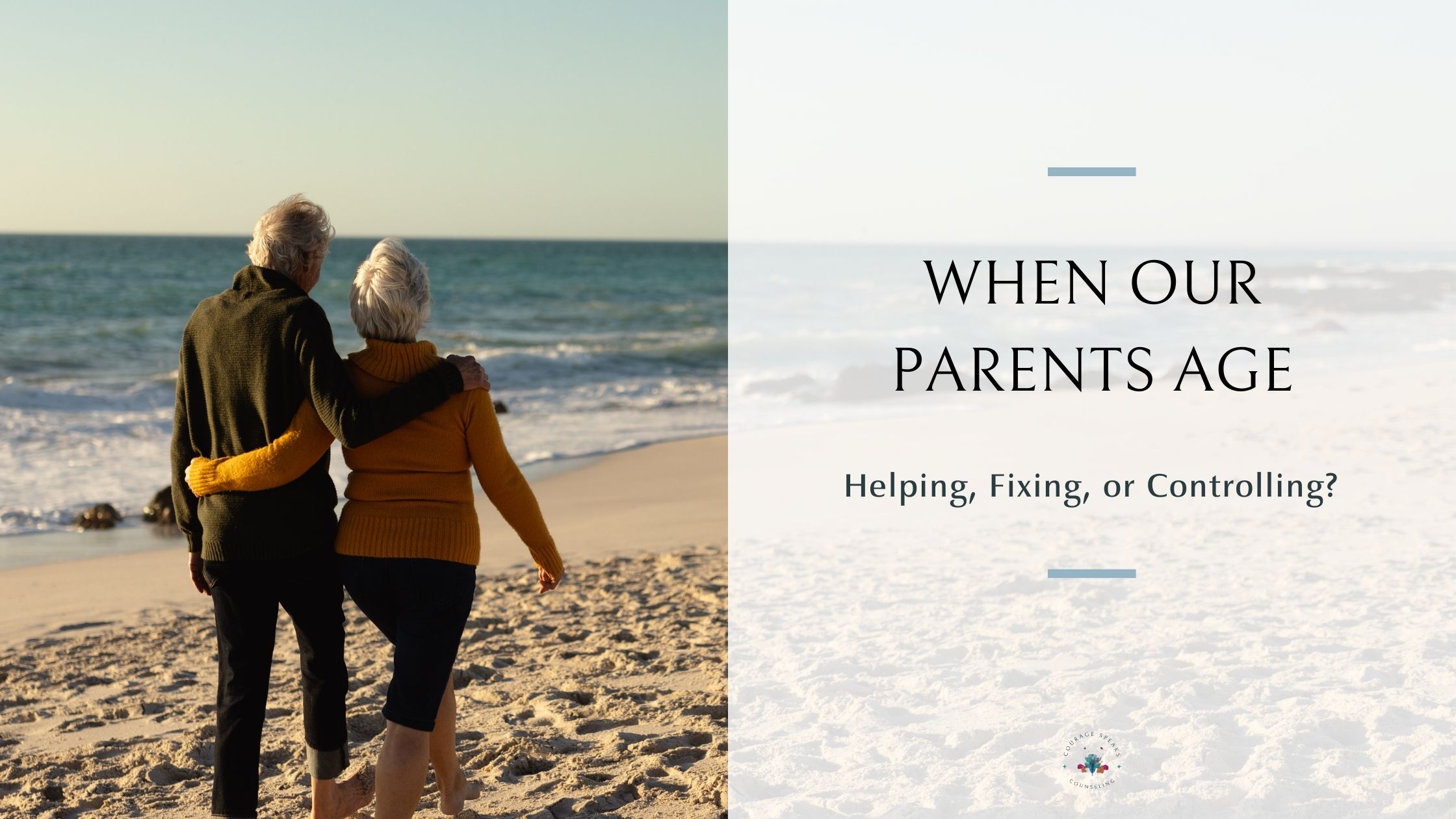As our parents grow older, something shifts inside us. Maybe it’s a sense of duty, a quiet panic, or a deep need to protect. We see them slowing down, making choices we don’t agree with, or struggling in ways that feel unnecessary—if only they’d just listen to us. And suddenly, we find ourselves managing, advising, maybe even pushing harder than they ever pushed us.
What’s happening here?
For many adult children, watching their parents age brings up a complex mix of emotions: love, fear, frustration, responsibility, and sometimes even grief. But for those of us who grew up without the foundation of a stable or reliable parent-child relationship, the experience is even more complicated.
When You’ve Always Been the Caregiver
If your parent wasn’t the steady, safe presence they were supposed to be—if you were the one managing their emotions, keeping them from spiraling, or even stepping into the role of caretaker from a young age—then their aging doesn’t just bring up worry. It brings up exhaustion.
Because you’ve been here before.
You were the one making things okay when they couldn’t. You were the one holding their burdens, smoothing over their chaos, trying to keep them safe from themselves or from the consequences of their own choices. You weren’t just a child; you were their emotional anchor. And now, as they grow older and more in need, the weight of that role threatens to return in full force.
So when you feel the urge to step in—to fix, to manage, to keep them from making yet another choice that could hurt them—you might tell yourself it’s just love. Just responsibility. But it may also be an old survival strategy kicking in: If I don’t manage them, everything will fall apart.
The Unspoken Fear Beneath Helping
We tell ourselves we just want to help, but often, helping is a mask for something else: the deep, familiar fear of what happens when they aren’t okay.
For some, it’s the fear of watching them decline and feeling helpless. But for others, it’s the fear that has always been there—that if we don’t take charge, the situation will spiral, just like it did when we were young.
That’s the difference. Some adult children are adjusting to a new role as their parents age. Others have been in this role for as long as they can remember. And that changes everything.
The Line Between Care and Control
So how do we navigate this? How do we love them, support them, and still allow them the agency to live their lives on their terms—especially when we’ve never been able to trust their choices?
The answer isn’t in forcing solutions or backing away entirely—it’s in recognizing what’s happening inside us when we feel that urge to take over. It’s in pausing before we push, and asking:
• What part of me is struggling with their choices?
• Am I trying to help, or am I trying to quiet my own discomfort?
• Is this about their well-being, or my need for control?
• Am I stepping in because they truly can’t care for themselves, or because I don’t trust them to?
For those of us who have always been the responsible one, it can feel impossible to step back. It can feel like neglect, or like we’re setting them up to fail. But the truth is, their life is shaped by their choices, just as ours is. If we felt responsible for them before, it wasn’t because we were supposed to—it was because the roles in our relationship were never quite right.
That imbalance was never ours to fix.
What Does It Mean to Care Without Being Responsible?
When we say we are not responsible for our aging parents’ well-being, it doesn’t mean we stop caring. It doesn’t mean we abandon them, ignore their needs, or refuse to help. It means we recognize that our care is a choice, not an obligation born out of guilt or old survival patterns. It means we differentiate between supporting them and controlling them.
True compassion isn’t about taking over someone’s life. It’s about showing up in ways that honor both their autonomy and our boundaries.
So What Does That Actually Look Like?
1. Offering Help, Not Forcing It
• We can ask, “Would you like help with that?” instead of assuming they can’t manage.
• If they say no, we let them have their choice—even if we don’t like it.
• If they say yes, we help in ways that align with what we’re willing and able to give.
2. Checking Our Own Reactions
• If they make a decision we disagree with, we ask ourselves: Is this about them, or about my own discomfort?
• Instead of reacting from frustration or fear, we pause and acknowledge what’s happening inside us.
• We remind ourselves: their choices belong to them, just as ours belong to us.
3. Giving What We Can, Without Overextending
• Caring doesn’t mean sacrificing ourselves. We can provide emotional support, time, or assistance within our limits.
• If they want more than we can give, we can say, “I love you, but I can’t do that.”
• It’s okay to set boundaries that protect our own well-being.
4. Allowing Consequences to Happen
• If they make decisions that have difficult outcomes, we resist the urge to rescue.
• We acknowledge that we don’t have to prevent every hardship in their life.
• We show compassion by being present, not by erasing their struggles.
5. Encouraging Interdependence Instead of Codependence
• We can help them build a support network that doesn’t rely solely on us.
• Encouraging them to connect with friends, community programs, or resources creates a healthier balance for everyone.
• This allows for care that is shared, sustainable, and not placed entirely on our shoulders.
How Does This Create a More Compassionate World?
Choosing not to take full responsibility for our parents’ well-being doesn’t mean choosing disconnection. In fact, the opposite is true:
• It deepens our relationships because we show up from love, not duty.
• It creates space for healthier interactions, rather than repeating old patterns of resentment and burnout.
• It honors dignity and autonomy, which is a form of love—allowing people to live their lives as they choose.
• It models healthy boundaries for future generations, teaching our children that care can be given without self-sacrifice.
The Balance Between Care and Autonomy
A world of connection, compassion, and care doesn’t mean erasing responsibility—it means reshaping it. It means creating a culture where we care with each other, not for each other in ways that strip away autonomy.
It’s about being present, offering support, and allowing the people we love—at any age—to make their own choices. It’s about caring without control, loving without losing ourselves.
We don’t have to carry everything. And maybe, in letting go of that weight, we actually show up with more love than ever before.
Embracing Shadows, Illuminating Hope,
Chelsey Fjeldheim, LCSW
Empowering Souls on the Path of Healing
Copyright © 2025 Chelsey Fjeldheim, Courage Speaks Counseling




